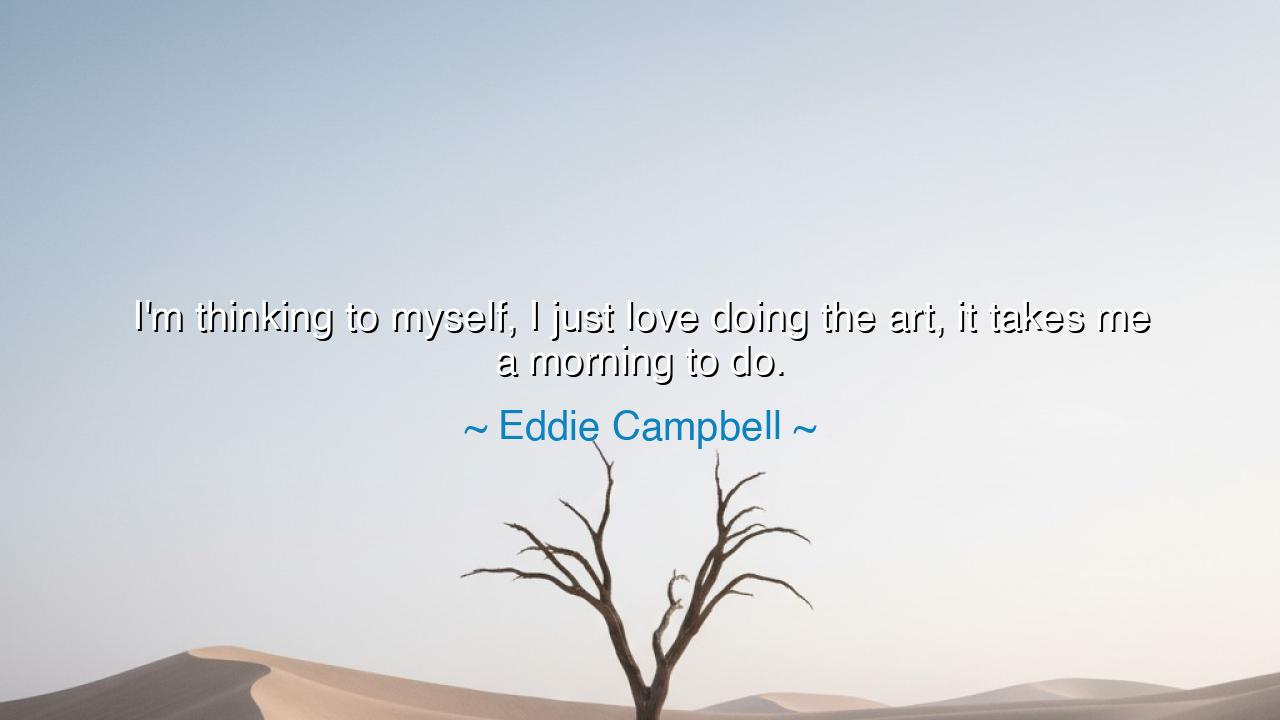
I'm thinking to myself, I just love doing the art, it takes me a






“I’m thinking to myself, I just love doing the art, it takes me a morning to do.” Thus spoke Eddie Campbell, the comic artist and storyteller whose works, from From Hell to Alec, carved deep paths in the landscape of modern graphic literature. At first glance, the words seem light, even casual—a man reflecting on a craft that to him feels natural, effortless, almost ordinary. Yet within this humble confession lies a profound truth: that the deepest joy is not in the glory of recognition, nor in the weight of ambition, but in the simple love of doing the art itself.
The origin of this saying is found in Campbell’s reflections on his process, where art was not a burden but a pleasure, not a task to be endured but a rhythm of life to be embraced. For him, a morning spent drawing was not wasted—it was the essence of fulfillment. The labor was not measured in profit or in fame, but in the joy of creation. What many would call work, he called love. In this, he stands with the sages of old who declared that the highest calling is to delight in one’s craft, to find in daily effort the very taste of eternity.
The ancients knew this truth well. When the Greek sculptor Pygmalion shaped his statue, it was not for the praise of kings but from sheer devotion to his art, until the gods themselves breathed life into his creation. When the Japanese poet Bashō wandered the countryside writing haiku, he did not seek monuments or riches, but the still joy of a moment captured in verse. So too Campbell reminds us that true artistry lives not in grand achievements but in the quiet mornings, where the hand moves with love and the heart is content.
History offers many such examples. Consider Leonardo da Vinci, who filled endless notebooks with sketches and designs, many of which were never finished or shown. Yet he drew not only for patrons or for posterity, but because he loved the act of seeing, observing, recording. His notebooks are a testament that joy in creation is often the truest measure of art’s worth. Leonardo’s legacy, like Campbell’s words, whispers to us: create because you love, not because you must.
From Campbell’s humble statement comes a mighty lesson: do not despise the smallness of your daily work. A morning given to your craft, no matter how modest, is no small thing if it fills your heart with love. The world may value speed, profit, and recognition, but the soul finds its nourishment in the act itself. When you lose yourself in the rhythm of creation, when time passes unnoticed, you have touched the sacred. For in those hours, you are not merely producing—you are living.
Practical wisdom follows. If you have a craft, give it your mornings, your hours, your hands. Do not wait for applause before you begin, nor abandon the work because the world is silent. Write the poem though no one reads it, paint the picture though no one sees it, play the song though no one hears it. In this practice lies freedom, for the joy of creation is itself the reward. And in time, perhaps, the world may recognize your work—but even if it does not, your mornings will have been well spent.
Thus, remember Campbell’s words: “I just love doing the art, it takes me a morning to do.” Let them stand as a beacon in an age obsessed with speed and outcome. They remind us that true artistry is not measured in hours or accolades but in love—the love of the process, the love of the craft, the love of creation itself. Embrace this wisdom, and you will find that even the humblest morning can become a masterpiece.






AAdministratorAdministrator
Welcome, honored guests. Please leave a comment, we will respond soon